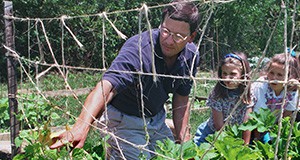Abstract
Research has found that youth involvement in school gardens leads to numerous benefits. However, teachers and support organizations must overcome barriers for garden sustainability. This 4-page document discusses barriers for school garden success and how Extension faculty can help education professionals overcome them. Written by Susan Webb, John Diaz, and Catherine Campbell and published by the UF/IFAS Department of Agricultural Education and Communication, August 2018.
http://edis.ifas.ufl.edu/wc315
References
Barker, S., Slingsby, D., & Tillin, S. (2002). Teaching biology outside the classroom. Is it heading for extinction? Retrieved from http://www.field-studies-council.org/media/268869/2002_biology_fieldwork._is_it_heading_for_extinction.pdf
Berenguer, J. (2007). The effect of empathy in proenvironmental attitudes and behaviors. Environment and Behavior, 39(2), 269-283. https://doi.org/10.1177/0013916506292937
Clay, G. (1999). Outdoor and adventurous activities: an OfSTED survey. British Journal of Physical Education, 30(2), 13-15.
Comishin, K., Dyment, J. E., Potter, T. G., & Russell, C. L. (2004). The development and implementation of outdoor-based secondary school integrated programs. Applied Environmental Education and Communication, 3(1), 47-53. https://doi.org/10.1080/15330150490270631
Dillon, J., & Dickie, I. (2012). Learning in the Natural Environment: Review of Social and Economic Benefits and Barriers. Retrieved from http://publications.naturalengland.org.uk/publication/1321181
Dillon, J., Morris, M., O'Donnel, L., Reid, A., Rickison, M., Scott, W. (2005). Engaging and Learning with the Outdoors - The Final Report of the Outdoor Classroom in a Rural Context Action Research Project. Retrieved from http://educationoutdoor.com/wp-content/uploads/2015/10/Engaging-and-Learning-with-the-outdoors.pdf
Dirks, A. E., & Orvis, K. (2005). An evaluation of the junior master gardener program in third grade classrooms. HortTechnology, 15(3), 443-447. https://doi.org/10.21273/HORTTECH.15.3.0443
Dyment, J. (2005). Green school grounds as sites for outdoor learning: Barriers and opportunities. International Research in Geographical and Environmental Education, 14(1), 28-45. doi:10.1080/09500790508668328 https://doi.org/10.1080/09500790508668328
Edward-Jones, A., Waite, S., & Passy, R. (2016). Falling into LINE: School strategies for overcoming challenges associated with learning in natural environments (LINE). Education 3(13), 1-15. doi:10.1080/03004279.2016.1176066 https://doi.org/10.1080/03004279.2016.1176066
Graham, H., Feenstra, G., Evans, A. M., & Zidenberg-Cherr, S. (2004). Davis school program supports life-long healthy eating habits in children. California Agriculture, 58, 200-205. doi:10.3733/ca.v058n04p200 https://doi.org/10.3733/ca.v058n04p200
Graham, H & Zidenberg-Cherr, S. (2005). California teachers perceive school gardens as an effective nutritional tool to promote healthful eating habits. Journal of the American Dietetic Association, 105(11), 1797-1800. https://doi.org/10.1016/j.jada.2005.08.034
Hazzard, E.L., Moreno, E., Beall, D. L., & Zidenberg-Cherr, S. (2011). Best practices models for implementing, sustaining, and using instructional school gardens in California. Journal of Nutrition Education and Behavior, 43(5), 409-413. https://doi.org/10.1016/j.jneb.2011.05.005
Kelly, O., & Cutting, R. (2011). Understanding places and society through history and geography outside the classroom. In Children Learning Outside the Classroom: From Birth to Eleven, edited by S.Waite, 106-119. London: Sage.
Lugg, A. (2004). Outdoor adventure in Australian outdoor education: Is it a case of roast for Christmas dinner? Australian Journal of Outdoor Education, 8(1), 4-11. https://doi.org/10.1007/BF03400790
Morris, J., Briggs, M., & Zidenberg-Cherr, S. (2000). School-based gardens can teach kids healthier eating habits. California Agriculture, 54(5), 40-46. https://doi.org/10.3733/ca.v054n05p40
Ogilvie, K. C. (2013). Roots and wings: A history of outdoor education and outdoor learning in the UK. Lyme Regis: Russell House Publishing.
Ozer, E. (2007). The effects of school gardens on students and schools: conceptualization and considerations for maximizing healthy development. Health Education & Behavior, 34(6), 846-863. doi:10.1177/1090198106289002 https://doi.org/10.1177/1090198106289002
Rahm, J. (2002). Emergent learning opportunities in an inner‐city youth gardening program. Journal of Research in Science Teaching, 39(2), 164-184. https://doi.org/10.1002/tea.10015
Rickinson, M, Dillon, J., Teamey, K., Morris, M., Choi, M.Y., Sanders, D., & Benefield, P. (2004). A review of research on outdoor learning. National Foundation for Educational Research and King's College London. Retrieved from https://www.field-studies-council.org/media/268859/2004_a_review_of_research_on_outdoor_learning.pdf
Rickinson, M., A. Hunt, J. Rogers, and J. Dillon. (2012). School leader and teacher insights into learning outside the classroom in natural environments. Natural England Commissioned Reports, Number 97.
Skelly, S. M., & Zajicek, J. M. (1998). The effect of an interdisciplinary garden program on the environmental attitudes of elementary school students. HortTechnology, 8(4), 579-583. https://doi.org/10.21273/HORTTECH.8.4.579
Waite, S. (2011). Teaching and Learning Outside the Classroom: Personal Values, Alternative Pedagogies and Standards. Education 3-13: International Journal of Primary, Elementary and Early Years Education, 39(1): 65-82. doi:10.1080/03004270903206141. https://doi.org/10.1080/03004270903206141
Waliczek, T. M., & Zajicek, J. M. (1999). School gardening: Improving environmental attitudes of children through hands-on learning. Journal of Environmental Horticulture, 17(4), 180-184. https://doi.org/10.24266/0738-2898-17.4.180
Williams, D. R., & Dixon, P. S. (2013). Impact of garden-based learning on academic outcomes in schools: Synthesis of research between 1990 and 2010. Review of Educational Research, 83(2), 211-235. https://doi.org/10.3102/0034654313475824
Unless otherwise specified, articles published in the EDIS journal after January 1, 2024 are licensed under a Creative Commons Attribution-NonCommercial-NoDerivs 4.0 International (CC BY-NC-ND 4.0) license.

